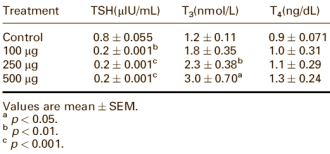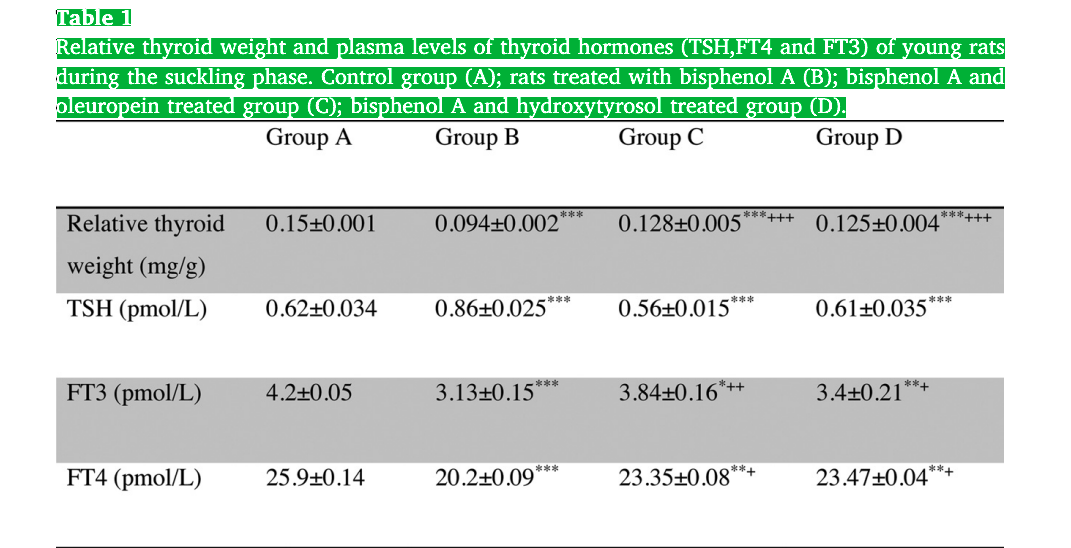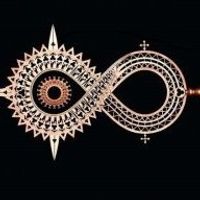Olive leaf extract increases T3 + T4, lowers TSH
-
Good news for olive oil enthusiasts. Recently I posted about the strong anti-cancer effects of one of olive oil's compounds called oleocanthal (https://bioenergetic.forum/post/36395)
Now in this study the researchers looked at olive leaf extract.
The researchers thought it increased t3 by speeding up T4 → T3 conversion. But as you can see in the table below, T4 also increased and TSH was only ¼ the value of the control group.
T3 was even increased by 2.5 times!
And as the article mentions those HED' s are easily achievable with cheap OTC supplements
"The researchers gave male rats weighing 125-150 g homemade water-based Olive Leaf Extract orally for 14 days. The maximal dose was 0.5 mg per day. That works out at 4 mg per kg bodyweight. For humans, that would be about 50 mg extract per day. That's not a lot. Drug stores sell capsules containing 150 mg Olive Leaf Extract."
https://www.ergo-log.com/olive-leaf-extract-active-thyroid-hormone.html
-
lt gets even better:oleurupin is a carbonic anhydrase inhibitor-both isoenzymes. So it increases CO2 retention in the body.It's not quite as strong as acetazolamide,but it is pretty good for a natural phenol.
https://pubmed.ncbi.nlm.nih.gov/34483220/Speaking of which there is a study that screened a few natural substances for the same activity, unfortunetly i cant get the full-text, but it includes some interesting substances like apigenin or
caffeic acid. Apigenin has been shown to be a carbonic anhydrase inhibitor in other studies already.
https://pubmed.ncbi.nlm.nih.gov/35306678/ -
Here's another study showing Oleuropein's pro- thyroid effect. It increased T3 and T4 in BPA-treated rats, while lowering TSH. It also had an anabolic effect on the bone.

-
Seems great but if it is so great what can we expect to be the downsides?
-
Another interesting compound contained in olives is hydroxytrosol.
It has been shown to be one of the strongest anti-oxidants and it inhibits MAO-B, increasing dopamine ."In-silico molecular docking study followed by MMGBSA binding free energy calculation revealed that HXT has a strong binding affinity for MAO-B in comparison to MAO-A. Moreover, rasagiline and HXT interacted with the similar binding sites and modes of interactions. Additionally, molecular dynamics simulation studies revealed stable nature of HXT-MAO-B interaction and also provided information about the amino acid residues involved in binding. Moreover, in vitro studies revealed that HXT inhibited MAO-B in human platelets with IC50 value of 7.78 μM. In vivo studies using MPTP-induced mouse model of PD revealed increase in DA levels with concomitant decrease in DA metabolites (DOPAC and HVA) on HXT treatment. Furthermore, MAO-B activity was also inhibited on HXT administration to PD mice. In addition, HXT treatment prevented MPTP-induced loss of DA neurons in substantia nigra and their nerve terminals in the striatum. HXT also attenuated motor impairments in PD mice assessed by catalepsy bar, narrow beam walk and open field tests. Thus, the present findings reveal HXT as a potential inhibitor of MAO-B, which may be used as a lead molecule for the development of therapeutics for PD."
-
 M Mauritio referenced this topic on
M Mauritio referenced this topic on
-
@Milk-Destroyer said in Olive leaf extract increases T3 + T4, lowers TSH:
Seems great but if it is so great what can we expect to be the downsides?
It might be too adrenergic for some. Lokzo made a video about it increasing noradrenaline.
Although it also increases T and lowers cortisol. -
"OLE significantly induced testicular steroidogenesis in diabetic rat as evidenced by elevated P450 scc and 17β-HSD mRNA expression"
https://pmc.ncbi.nlm.nih.gov/articles/PMC6438850/P450scc increases Pregnenolone
https://en.m.wikipedia.org/wiki/Cholesterol_side-chain_cleavage_enzymeIt increases mating success /fertility by 50% in diabetic rats in the above study.
-
-
@Mauritio how many mg a day are we talking about here to have those androgenic effects?
-
@tubert said in Olive leaf extract increases T3 + T4, lowers TSH:
@Mauritio how many mg a day are we talking about here to have those androgenic effects?
That was a high dose. 3-6g HED of the leave extract. It was in diabetic rats so its hard to convert to humans, probably best just to try it out.
-
@Mauritio said in Olive leaf extract increases T3 + T4, lowers TSH:
It might be too adrenergic for some. Lokzo made a video about it increasing noradrenaline.
Although it also increases T and lowers cortisol.So it increases thyroid, noradrenaline and dopamine? But lowers cortisol and thus presumably lowers adrenaline? Or do the increases in DA and NA relatively outweigh a concurrent increase of A? Plus it offers HDACi 1+2? And raises androgens and raises BDNF and improves fat metabolism? I should be munching on olive leaves rn. Yes where's the catch I wonder too.
DA+ and NA+ is a very interesting combination and much sought after, I'd say, in many conditions. This should delve deeply right into territory of dirty psychiatric medications of which afaik none tackle such a desirable combination.
Curious about OLE/Hydroxytyrosol +anxiety +depression studies, if ever trialled. -
@CrumblingCookie said in Olive leaf extract increases T3 + T4, lowers TSH:
DA+ and NA+ is a very interesting combination and much sought after, I'd say, in many conditions.
Generally, most things that increase dopamine, increase noradrenaline. For example, ergot derivatives such as bromocriptine and cabergoline increase noradrenaline, caffeine increases noradrenaline, amantadine and mementine increase noadrenaline, etc. I am pretty sure the majority of dopaminergic substances increase noradrenaline, apart from a few exceptions such as progesterone.
@CrumblingCookie said in Olive leaf extract increases T3 + T4, lowers TSH:
This should delve deeply right into territory of dirty psychiatric medications of which afaik none tackle such a desirable combination.
Are you suggesting that there are no popular medications that don't increase DA and NA?
Not sure but bupropion is the 21st most prescribed medicine, and its mechanism of action is being a dopamine and noradrenaline reuptake inhibitor (it promotes these two)
-
@alfredoolivas Thanks for your reply.
Are you suggesting that there are no popular medications that don't increase DA and NA?
I kind of was, yes. The case of bupropion e.g. is not truly dopaminergic in practice.
Caffeine is a good point yes but it's also somewhat contradictory and double-edged.
Bromocriptine, amantadine and memantine, cabergolin I have no experience with and they're all kept restricted in their prescription labeling unless one already has full-blown PD. Other ergot derivatives like metergolin or lisurid or ergotiamin have been bought up and globally phased out.
In this light the potential properties of OTC OLE appear alluring. -
@CrumblingCookie sadly dopamine agonists are not usually prescribed to patients, even in Parkinsons, as they usually just prescribe Levodopa, so of course none of these drugs are commonly prescribed.
Pramixepole is the new dopamine agonist and that increases noradrenaline, and as far as I know, Amantidine and especially memantine, are commonly prescribed off-label, for many conditions such as MS and depression.
Why isn’t Bupropion a good DA reuptake inhibitor? It’s even combined with naltrexone, in a formula called Mysimba, which creates an anti-opioid, anti endotoxin, pro dopamine and noradrenaline effect
-
 M Mauritio referenced this topic on
M Mauritio referenced this topic on